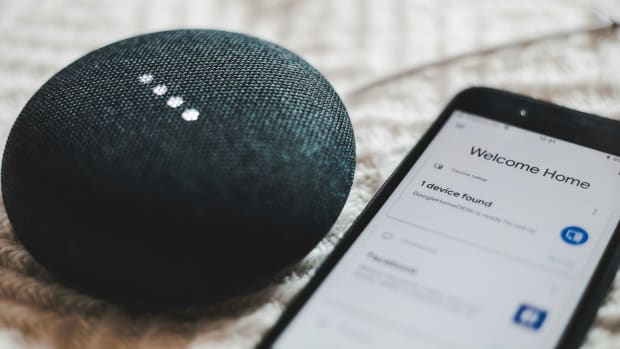
Parents’ concerns about privacy smart speakers do not lead to less use
Three in ten Dutch families with young children have a smart speaker in their home. Research by UvA PhD candidate Rebecca Wald shows that parents are rightly concerned about their privacy, but that this does not translate into less use of the speaker.
Three in ten Dutch families with young children now have a smart speaker in their home. This is according to research by Rebecca Wald, who will soon defend her PhD research into smart speakers in families. Among other things, she looked at why parents did or did not buy a smart speaker and their concerns about online privacy. To function, a smart speakerA smart speaker is a loudspeaker with a built-in voice assistant (such as Google Assistant or Amazon Alexa) that allows you to play music, ask questions, or control smart devices in your home using voice commands. listens for a so-called wake word, such as “Hey Google” or “Alexa.” When the speaker recognizes this, it starts recording. The speaker then responds to what it has understood.
“Interestingly, almost every parent is concerned about their online privacy, but that hardly translates into a decision not to purchase such a device or to use it less,” says Wald. Even intensive users say they are concerned about their privacy. This worries the researcher because tech companies “exploit” their users by using their data for other purposes.

Dangers and privacy risks
Tech companies use the data obtained by smart speakers to build detailed profiles of users. “The fact that you always get up at seven o’clock and then ask about the weather is data that is stored.” Third parties could also gain access to your address via location data collected by the smart speaker, which could be leaked through an insecure network connection. This is reported by technology newspaper Wired. In combination with voice recognition and usage patterns, the company can even gain insight into the size of your household and who is present. If a malicious person gains access to your account or data through a data breach, that person could know your address and home situation, making burglary easier, for example.
In addition, tech companies can personalize advertisements. Wald: “Google can, for example, link the collected data to other Google services you use. For example, Google can recommend restaurants in Google Maps based on what the smart speaker stores.” Users often unknowingly give their consent to this in the terms and conditions of linking their Google account, which is inevitable for using a Google smart speaker, says Wald.
“In the EU, there are good protective measures in place to ensure that your data cannot be used for other purposes, but many of these tech companies are not based in the EU,” says Wald. This poses risks. LexisNexis, an American company that collects databases, shows that the GDPRThe General Data Protection Regulation (GDPR) is European privacy legislation that protects how organizations collect, store, and use personal data, and gives citizens rights such as access to, correction, and deletion of their data. laws in the EU conflict with US legislation because the US government can compel tech companies to hand over data—including that of European users. This is called the CLOUD Act. Microsoft announced last month that it must indeed hand over their data if the US government requests it under the CLOUD act. Google itself says that it carefully reviews every request for user data and, if data is shared, records this in its transparency report. The number of requests from governments for user information has clearly increased in recent years.
Parents are therefore rightly concerned about their privacy, according to Wald. It should be noted that the revenue model for smart speakers is closely linked to the collection and use of user data. A Google speaker costs around forty euros. “That’s relatively inexpensive. You only have to pay once, and then you have a smart speaker forever. What does a tech company get out of that? Your data. This data is used to train the language model behind the assistant and to get to know the user better.”
Wald also has other privacy concerns because smart speakers are constantly present in the home environment and can record conversations. They normally only activate after the wake word is heard, but sometimes a recording is accidentally started because you say something that sounds like it. “All these voice recordings are transcribed into text and stored in your user profile,” Wald explains. This means that personal conversations can be recorded without anyone noticing.
“You’re unwittingly giving away a stream of intimate information,” says Wald. In fact, in 2019, Belgian broadcaster VRT reported that Google contractors were actually listening in on Dutch-language conversations recorded via Google Home and Google Assistant. This was intended for training purposes, but users were unaware that recordings of their conversations would actually be listened to by someone. Google employees listened to families arguing or requests to watch pornography and had to transcribe this word for word to compare it with what the smart speaker picked up.
Children
In addition, Amazon Alexa, for example, offers a special children’s speaker—made to look good in the child bedroom by decorating it as a dinosaur, says Wald. “But until the child is old enough to create their own account, the child’s account falls under that of the parent. This means that parents have access to all recordings and therefore also to what the child says. They can view the stored commands online in their user account. But you wouldn’t just read your child’s diary either. Maybe your child has questions that they would rather not ask their parent.” According to Wald, this also raises ethical questions about the extent to which this affects the child’s privacy and the extent to which important parenting tasks, such as answering curious questions, are delegated to technology.
Wald’s research shows that although parents are concerned about their own privacy and that of their children, they do little to protect themselves. And that is reprehensible, says Wald. Because when users feel uncomfortable but show no change in their usage, there is no significant incentive for companies to change their technology or service. Wald: “Many users seem to fall into the trap of thinking that you can’t change what big tech companies do with your data anyway. Ultimately, the convenience and enjoyment of the speaker seem to outweigh this concern.”
Protect yourself
Nevertheless, parents and users can take a number of steps to protect their privacy to some extent. Wald has some tips: “For example, you can regularly view and delete the transcripts from your smart speaker. If you do that, consider making agreements with your child if it also concerns his or her data. Adjust settings to stop or reduce the storage of voice recordings and disable linked features such as personalised ads.” You can also temporarily turn off the smart speaker when you are not using it or want to have an intimate conversation where you feel more comfortable without a microphone on in the background.
Rebecca Wald will defend her dissertation on Friday, September 19, at 1:00 p.m. “Hey Google, Welcome to the Family?!” Taking a Differential Perspective on the Selection and Use of Smart Speakers in Families. The defense will take place in the Agnietenkapel.


